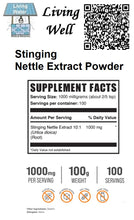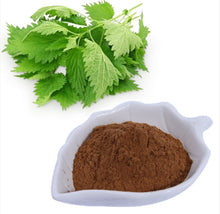
Livingwell Organic Stinging Nettle Extract Powder
Stinging Nettle Extract Powder is high in amino acids, protein, flavonoids, and bone-building minerals like iron, calcium, magnesium, potassium, and zinc. Nettle contains vitamins and minerals that can help keep your bones strong. Stinging nettle is one of the greatest sources of vitamin K.
Stinging nettle is a nutritious plant popular in Western herbal medicine. It may reduce inflammation, hay fever symptoms, blood pressure and blood sugar levels — among other benefits.
Prostate Health: Stinging nettle is commonly used to support prostate health.
Anti-Inflammatory Properties: Stinging nettle powder has anti-inflammatory properties that may help reduce inflammation in the body.
Urinary Health: Stinging nettle is believed to have diuretic properties that can help support urinary tract health, reduce water retention, and promote kidney function.
Hair and Skin Health: Some studies suggest that stinging nettle may help promote hair growth and improve skin conditions due to its anti-inflammatory and antioxidant effects.
Nutrient-Rich: Stinging nettle is rich in vitamins, minerals, and antioxidants, providing essential nutrients for overall health and well-being.
Its scientific name, Urtica dioica, comes from the Latin word uro, which means “to burn,” because its leaves can cause a temporary burning sensation upon contact.
The leaves have hair-like structures that sting and also produce itching, redness and swelling .
However, once it is processed into a supplement, dried, freeze-dried or cooked, stinging nettle can be safely consumed. Studies link it to a number of potential health benefits.
-
Vitamins: Vitamins A, C
and K, as well as several B vitamins -
Minerals: Calcium, iron,
magnesium, phosphorus, potassium and sodium -
Fats: Linoleic acid,
linolenic acid, palmitic acid, stearic acid and oleic acid - Amino acids: All of the essential amino acids
-
Polyphenols: Kaempferol,
quercetin, caffeic acid, coumarins and other flavonoids -
Pigments: Beta-carotene, lutein,
luteoxanthin and other carotenoids
Stinging Nettle may Treat Enlarged Prostate Symptoms
Up to 50% of men aged 51 and older have an enlarged prostate gland.
An enlarged prostate is commonly called benign prostatic hyperplasia (BPH). Scientists aren’t sure what causes BPH, but it can lead to significant discomfort during urination.
Interestingly, a few studies suggest that stinging nettle may help treat BPH.
Animal research reveals that this powerful plant may prevent the conversion of testosterone into dihydrotestosterone — a more powerful form of testosterone.
Stopping this conversion can help reduce prostate size.
Studies in people with BPH demonstrate that stinging nettle extracts help treat short- and long-term urination problems — without side effects.
May Lower Blood Pressure
Nearly half of adults in the United States have high blood pressure.
High blood pressure is a serious health concern because it puts you at risk of heart disease and strokes, which are among the leading causes of death worldwide.
Stinging nettle was traditionally used to treat high blood pressure.
Animal and test-tube studies illustrate that it may help lower blood pressure in several ways.
For one, it may stimulate nitric oxide production, which acts as a vasodilator. Vasodilators relax the muscles of your blood vessels, helping them widen .
In addition, stinging nettle has compounds that may act as calcium channel blockers, which relax your heart by reducing the force of contractions.
¿Qué beneficios tiene el extracto de ortiga?
¿Que uso se le da al extracto de ortiga?
Extracto de Raíz de Ortiga: Usos y Beneficios de la Planta:
El extracto de ortiga ha sido empleado tradicionalmente para el tratamiento del asma, el crecimiento del cabello, la diabetes, otras condiciones. Los complementos alimenticios no están destinados al tratamiento de condiciones que requieran de atención médica; y tales efectos no han sido validados científicamente.
Polvo de Extracto de Raiz de Ortiga triene un efecto positivo sobre la circulación sanguínea que ayuda a disminuir sus niveles de azúcar y a bajar la presión arterial. Por ello, la ortiga puede ser útil en caso de tener una disminución anormal del número o tamaño de los glóbulos rojos o de su nivel de hemoglobina.
La ortiga puede disminuir la presión arterial , por lo que podría potenciar los efectos de estos medicamentos: Inhibidores de la ECA: Captopril (Capoten), Elaropril (Vasotec), lisinopril (Zestril), fosinopril (Monopril)
En cocimiento y en aplicaciones locales o baños se emplea en dolores reumáticos, artritis, gota, neuralgias, hemorroides (pomada de ortiga),
afecciones de la piel y del cuero cabelludo (caspa y caída del cabello; en este último caso mezclada con hojas de romero Castilla y toronjil cuyano). La ensalada de ortiga apenas escaldada es considerada muy eficaz para combatir la anemia.
Para el empleo de ortiga en afecciones renales existen incluso datos clínicos. En fitoterapia clínica se emplea como drenador hepático y diurético de tipo volumétrico y eliminador de ácido úrico.






